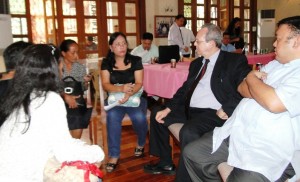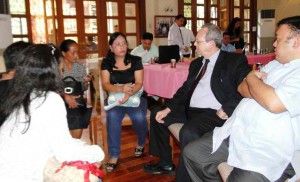By MYLAH ROQUE
 RELATIVES of victims of the year-old Maguindanao massacre on Monday sought the help of the visiting United Nations Special Rapporteur for Freedom of Opinion and Expression in speeding up prosecution of members of the Ampatuan family and more than a hundred others charged with the multiple killings that have been described as the country’s worst election-related violence.
RELATIVES of victims of the year-old Maguindanao massacre on Monday sought the help of the visiting United Nations Special Rapporteur for Freedom of Opinion and Expression in speeding up prosecution of members of the Ampatuan family and more than a hundred others charged with the multiple killings that have been described as the country’s worst election-related violence.
“Can you be a bridge to our government as our justice is so delayed?” Catherine Nunez, mother of one of the 32 journalists and media workers killed in the massacre, asked Special Rapporteur Frank William La Rue during a lecture-dialog held at the University of the Philippines College of Law.
Nunez specifically asked if the U.N. could facilitate with the Philippine government a speedier resolution of the prosecution of the case.
La Rue is in Manila not on an official visit but to participate in activities marking the first anniversary of the massacre. But he told Nunez, “As a matter of principle, impunity often comes (not just) as denial of justice but also as slowness of justice.”
La Rue expresed optimism over the prospect of coming to the Philippines on a formal visit, but at the same time said it could happen only after requests and invitations are made by a broad spectrum of affected individuals and institutions.
He would need a formal invitation from the Philippine government to conduct a formal factfinding.
The last time such an official invitation was issued was in February 2007, when Philip Alston, then the UN Special Rapporteur on Extrajudicial, Summary or Arbitrary Executions, visited and issued a report characterized by a strong disapproval of the many executions that occurred during the Arroyo government.
As special rapporteur, La Rue has a mandate from the U.N. High Commissioner for Human Rights to conduct factfinding missions relating to violations of the right to freedom of opinion and expression, discrimination, threats and violence against journalists or other professionals in the field of information.
La Rue noted that it is in the Philippines that the highest number of journalists killed in a single instance happened.
The 2010 Impunity Index of the Committee to Protect Journalists ranked the Philippines third worldwide, after Iraq and Somalia, among the countries where journalists are killed regularly and governments fail to solve the crimes.
At the lecture-dialog sponsored by CenterLaw, Media Legal Defence Initiative and the National Union of Journalists of the Philippines, La Rue talked about his experience as a Guatemalan human rights lawyer and how mechanisms such as the U.N.-sponsored International Commission Against Impunity in Guatemala could be a useful model for other countries.
Besides Nunez, relatives of massacre victims who attended the lecture-dialog were Myrna Reblando, Editha Tiamzon, Julieta Evardo, Zenaida Duhay and Ma. Cipiriana Gatchalian.
Two Filipino comfort women— Isabelita Vinuya and Perla Balingit—also spoke with La Rue.
